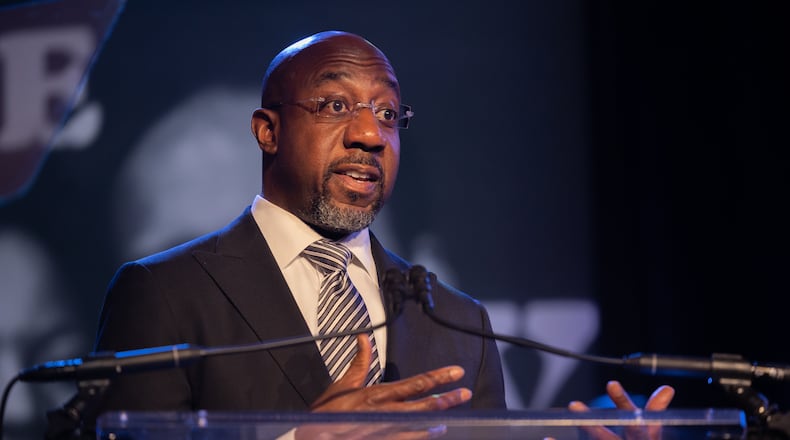U.S. Sen. Raphael Warnock’s memoir doesn’t open with a dramatic moment from the 2020 campaign trail or a thundering sermon from the historic pulpit of the Rev. Martin Luther King Jr. It begins with the painful story of his brother’s arrest in an FBI sting.
It was incomprehensible, Warnock wrote in “A Way Out of No Way,” that the older brother he idolized was charged along with other Savannah-area police officers with aiding and abetting the distribution of cocaine by providing security for drug dealers.
As the Democrat learns more about the charges against Keith Coleman, and takes readers along for the struggle to hire attorneys and deal with emotional moments in the trial, Warnock finds that his disappointment in his brother “was matched by my anger at the criminal justice system.”
“It seemed clear to me that the federal government had taken full advantage of a rookie cop who used very bad judgment,” Warnock wrote. “And no matter what my brother’s role might have been, he deserved fair treatment in a system with a long history of racism.”
The ordeal is among the deeply personal stories embedded in a memoir released Tuesday that focuses more on Warnock’s path to political activism and less on behind-the-scenes drama from his 2021 victory over Republican U.S. Sen. Kelly Loeffler.
In fact, Loeffler is hardly mentioned in the book. Instead, it’s full of tales about Warnock’s upbringing in a public housing project with 11 siblings and two doting parents, and the go-getter gumption it took to rise to one of the nation’s most important pulpits.
He documents his early dreams of becoming a preacher — and playing pranks on an unsuspecting brother — along with his growing passion for influencing public policy as he took pastoral jobs in New York, Baltimore and finally the famed Ebenezer Baptist Church in Atlanta.
Warnock outlines how he was initially rejected for the coveted job at Ebenezer before a surprising turnabout helped him land it — and his desire to ensure that the Atlanta institution continues to serve as “a real church, a resilient church, not a monument.”
That job hasn’t been without tension, such as when Warnock and then-Georgia Attorney General Thurbert Baker — a prominent Ebenezer member — took opposing sides in a high-profile criminal justice case involving a Georgia teenager.
Credit: TNS
Credit: TNS
No ‘magic’ required
As he grew more forceful advocating for voting rights, Medicaid expansion and changes in criminal justice, local Democrats took notice. Several friends and allies urged Warnock to seek public office, an idea that the pastor wrestled with for most of the past decade.
When he asked civil rights hero John Lewis, an Ebenezer congregant, to mentor him, Warnock was surprised by the then-congressman’s response: “Oh, you don’t need it.”
“His words didn’t feel dismissive; that was not his way,” Warnock wrote. “He just seemed to be saying there was no magic complicated formula that needed studying. That in his line of work you learn by doing, by showing up, by putting your body in the game.”
Warnock, of course, would do just that after deciding against running for the U.S. Senate in 2014 and 2016. After Johnny Isakson decided to retire early, Warnock prayed, consulted with advisers, met with parishioners and prayed some more.
“Finally, I came to realize there may never be a more perfect moment, that life was full of unexpected dips and curves, but that so many people, including me, had put in years of work for this opportunity.”
Credit: TNS
Credit: TNS
There’s little about campaign controversies or backroom strategies in the final months of the epic election, which culminated in Democratic victories that flipped control of the chamber. An altercation with his ex-wife that drew headlines isn’t mentioned.
Warnock instead sticks to broader themes. He goes into detail about policy positions on major debates that will help define his reelection bid — and his outlook at a time of great uncertainty about the nation’s future.
“We are the latest generation that gets to decide whether we’re going to give in to bigotry or fear or push closer to our democratic ideals,” Warnock wrote.
“I choose hope. I choose inclusivity. I choose equal protection under the law. I choose truth and justice. I choose the beloved community.”
About the Author
The Latest
Featured







